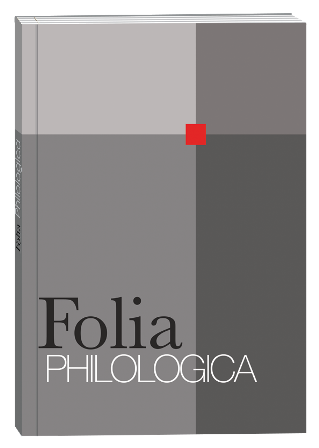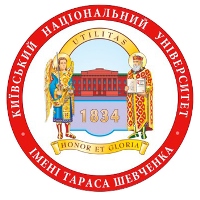PAIN CONCEPT AS REPRESENTATION OF FRUSTRATED PROCESSES OF LINGUISTIC PERSONALITY: A CASE STUDY OF SVITLANA YOVENKO'S POETIC WORKS
DOI:
https://doi.org/10.17721/folia.philologica/2022/3/11Keywords:
linguistic personality, conceptual sphere, categorical-lexical sema, pain, confluence, projectivityAbstract
The article outlines expression of the conceptual of linguistic personality in poetic works by the Ukrainian author Svitlana Yovenko. The sphere of concepts of linguistic personality is formed at the stage of conceptualization and categorization where the worldview is designed by means of language and representation of sphere of concepts finds expression at the verbal and semantic level. Decoding of the latter occurs occurs through the analysis of the character’s individual lexicon. Different physical and psychological states characteristic to the image of linguistic personality are displayed in the conceptual sphere. It was revealed that the conceptual sphere of PAIN is the basis for creating a picture of the world of her work, which comprehensively presents the negative state of the linguistic personality on both the physical and psychological levels. One of its dominant psychological states rendered on verbal and semantic level is pain as a universal sign of destructive interaction between an organism and the world around. Hence, protective mechanisms represented by introjection and extrajection become universalistic ways for overcoming it. S. Yovenko’s poetry represents construal of the linguistic personality image. It is revealed that the conceptual sphere PAIN is based on categorial and lexical semes that represent the condition of linguistic personality frustration. The conceptual sphere is formed by means of detecting protective mechanisms shown clearly through confluent and projective vectors in verses by S. Yovenko. Confluent vector of linguistic personality state which is dominating by the width of semantic expression and completeness of descriptions is revealed through substantial (lexis for space, concreteness, ontic identification) and processual lexeme semantics. Projective vector finds its reflection through substantive (ontical, abstract), processual semantics focusing on actions, signs, feelings of object.
References
Boldyrev, N. (2016). Kognitivnye shemy yazykovoy interpretatsii [Cognitive layouts of linguistic interpretation]. Voprosy kognitivnoy lingvistiki – Questions of cognitive linguistics, no. 4, pp. 10–20 [in Russian].
Vorkachev, S. (2001). Lingvokulturologiya, yazyikovaya lichnost, kontsept: stanovlenie antropotsentricheskoy paradigmy v yazykoznanii [Linguistic culture, linguistic personality, concept: the formation of anthropocentric paradigm in linguistics]. Filologicheskie nauki – Philological sciences, no. 1, pp. 64–72 [in Russian].
Gorelov, I., Sedov, K. (1997). Osnovy psiholingvistiki [Fundamentals of psycholinguistics]. Moscow: Labirint, 220 p. [in Russian].
Dyka, N. (2016). Realizatsiia kontseptu movnoi osobystosti u suchasnii linhvodydaktytsi [Realization of linguistic personality concept in modern linguodidactics]. Pedahohichnyi protses: teoriia i praktyka. Seriia “Pedahohika” –Teaching process: theory and practice. Series “Pedagogy”, no. 2(53), pp. 32–36 [in Ukrainian].
Zahnitko, A. (2016). Movna osobystist v epistoliarnomu dyskursi: typolohiia linhvoindyviduatsii i linhvoindyvidualizatsii [Linguistic personality in the epistolary discourse: the typology of linguistic indiations and linguisindividualizations]. Humanitarna osvita v tekhnichnykh vyshchykh navchalnykh zakladakh – Humanitarian education in technical higher educational establishments, no. 33, pp. 58–71 [in Ukrainian].
Ivantsova, E. (2010). О termine “yazykovaya lichnost”: istoki, problemy, perspektivy ispolzovaniya [About the term “linguistic personality”: origins, problems, prospects for using]. Vestnik Tomskogo gosudarstvennogo universiteta – Tomsk State University Journal, no. 4(12), pp. 24–32 [in Russian].
Yovenko, S. (1975). Oblychchia vitru [Face of the wind]. Kyiv : Dnipro, 111 p. [in Ukrainian].
Yovenko, S. (1977). Buzok u sichni [The lilac in january]. Kyiv : Radianskyi pysmennyk, 159 p. [in Ukrainian].
Yovenko, S. (1987). Nerozkrytyi konvert [Unopened envelope]. Kyiv : Molod, 122 p. [in Ukrainian].
Yovenko, S. (1989a). Bezsmertia lastivky [Immortality of the swallow]. Kyiv : Dnipro, 487 p. [in Ukrainian].
Yovenko, S. (1989b). Vich-na-vich [Face to face]. Kyiv : Radianskyi pysmennyk, 110 p. [in Ukrainian].
Yovenko, S. (2010). Liubov i Smert [Love and Death]. Kyiv : Yaroslaviv Val, 720 p. [in Ukrainian].
Karasik, V. (2002). Yazykovoy krug: lichnost, kontsepty, diskurs [Language circle: personality, concepts, discourse]. Volgograd : Peremena, 477 p. [in Russian].
Karaulov, Yu. (2010). Russkiy yazyk i yazykovaya lichnost [The Russian Language and linguistic personality]. Moscow: LKI, 264 p. [in Russian].
Kobrina, N. (2000). Kognitivnaya lingvistika: istoki stanovleniya i perspektivy razvitiya [Cognitive linguistics: origins and development prospects]. Kognitivnaya semantika: materialy Vtoroy mezhdunarodnoy shkoly-seminara po kognitivnoy lingvistike [Cognitive semantics: Materials of the Second International School-Seminar on Cognitive Linguistics]. (Tambov, September 11–14, 2000), in 2 vols. Tambov : Tambov State University named after G.R. Derzhavin, vol. 2, pp. 170–175 [in Russian].
Lyapon, M. (1995). Yazykovaya lichnost: poisk dominanty [The language personality: search for dominant]. Yazyk – sistema. Yazyk – tekst. Yazyk – sposobnost’: k 60-letiyu chlena-korrespondenta RAN Yu.N. Karaulova [Language is a system. Language is text. Language is ability: to the 60th anniversary of the corresponding member of the RAN Yu.N. Karaulov] / ed. by Yu. Stepanov, E. Zemskaya, A. Moldovan. Moscow : Russian Language Institute of the Russian Academy of Sciences, pp. 260–276 [in Russian].
Maslova, V. (2001). Lingvokulturologiya [Linguoculturology]. Moscow : Akademiya, 208 p. [in Russian].
Mokhovikov, A. (2003). Psikhicheskaia bol, priroda, diahnostika i printsipy heshtaltterapii [The psychic pain, nature, diagnosis and principles of gestalt therapy]. Moskovskiy psikhoterapevticheskiy zhurnal – Moscow Psychotherapeutic Journal, no. 4, pp. 104–127 [in Russian].
Mokhovikov, A. (2001). Suitsidolohiia: proshloie i nastoiashcheie. Problema samoubyistva v trudakh filosofov, sotsiolohov, psikhoterapevtov i v khudozhestvennykh tekstakh [Suicidology: the past and present. The problem of suicide in writings of philosophers, sociologists, psychotherapists and literary texts]. Moscow : Kohyto-Tsentr, 274 p. [in Russian].
Popova, Z., Sternin, I. (2007). Kognitivnaya lingvistika [Cognitive linguistics]. Moscow: AST; Vostok-Zapad, 314 p. [in Russian].
Smahlii, I. (2017). Avtorska svidomist ta svoieridnist yii poetychnoho vyrazhennia v poezii Svitlany Yovenko [The author’s consciousness and its poetic expression in Svetlana Yovenko’s poetry]. Candidate’s thesis. Berdiansk : Berdianskyi derzhavnyi pedahohichnyi universytet, 226 p. [in Ukrainian].
Sukhikh, S. (2004). Lichnost v kommunikativnom protsesse [A personality in the communicative process]. Krasnodar : YuIM, 156 p. [in Russian].
Freid, Z. (2006). Ya i Ono [I and It]. Moscow : Eksmo, 864 p. [in Russian].









